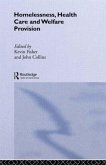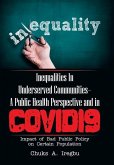How welfare states influence population health and health inequalities has long been debated but not well tested by empirical research. This book presents new empirical evidence of the effects of Swedish welfare state structures and policies on the lives of Swedish citizens. The discussion, analysis, and innovative theoretical approaches developed in the book have implications for health research and policy beyond Scandinavian borders. The book builds an understanding of the impact of living conditions and welfare policies on health inequalities, showing how health inequalities change over the years, and assessing the impact of environment on health inequalities at home, at school, and in the workplace.








